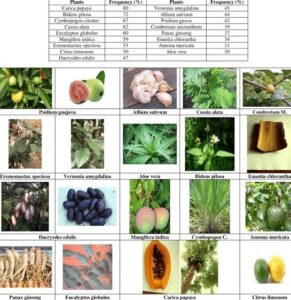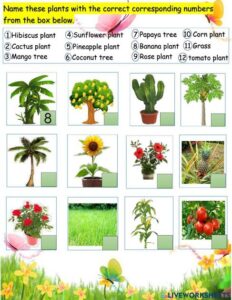Back to: Botany 500 Level
How far, my Afrilearn explorer?
I’m so glad you’re here for today’s lesson, and I’m really excited about this one! Today, we’re going to talk about the report on local plant usage in nearby communities. This topic is all about learning how different plants are used in local communities around you, how they contribute to daily life, and how traditional knowledge is passed down from generation to generation. Ready? Let’s jump in!
Report on local plant usage in nearby communities
Every community, big or small, has its own unique relationship with plants. In Nigeria, people have long relied on plants for various purposes—whether it’s for food, medicine, spiritual rituals, or even construction materials. As a botany student, understanding how plants are used in different Nigerian communities can help you appreciate the local knowledge of plants and their uses. It’s a great way to connect science with real-world practices and to observe how plants are integrated into everyday life.

Body – Report on Local Plant Usage in Nearby Communities
- Food Plants
- Yams and Cassava: Yams and cassava are staples in many Nigerian communities, especially in the South and Middle Belt. These tubers are essential parts of Nigerian cuisine. They are used to make dishes such as pounded yam, yam porridge, cassava flour, and garri. The method of growing and processing these plants is often passed down through generations. In some villages, festivals are even dedicated to the yam harvest as it symbolizes prosperity and abundance.
- Maize (Corn): Maize is another important crop used as food in many Nigerian communities. It can be roasted, boiled, or ground into flour for making pap (fermented maize porridge) and akara (bean cakes). The ways people prepare and consume maize vary across regions, but it’s a common food crop everywhere.
- Medicinal Plants
- Moringa (Moringa oleifera): Known as the drumstick tree, Moringa is popular in many Nigerian communities for its medicinal properties. The leaves, seeds, and pods are used in traditional medicine to treat a wide range of conditions such as malnutrition, high blood pressure, and inflammation. People in rural areas often use Moringa as a natural remedy, either by boiling the leaves in tea or using the powder in food.
- Neem (Azadirachta indica): The neem tree is widely used in Nigerian communities, especially in northern Nigeria, for its medicinal properties. The leaves and bark are used to treat malaria, fever, and even skin infections. Traditional healers often prepare infusions from neem leaves, which are believed to have strong antibacterial and antiviral properties.
- Spiritual and Ceremonial Plants
- Kola Nut (Cola spp.): In several Nigerian communities, particularly among the Yoruba, Igbo, and Efik people, the kola nut is a symbol of hospitality, unity, and respect. It is an essential part of ceremonies like weddings, funerals, and religious gatherings. Breaking the kola nut is seen as a ritual that opens the space for prayers and blessings. In some areas, the kola nut is also used in spiritual rituals to invoke good fortune and protection.
- Scented Leaves (Ocimum spp.): In some Nigerian communities, aromatic plants like basil are used in spiritual rituals to ward off evil spirits. These plants are often used in cleansing ceremonies, where the leaves are burned or boiled to create a smoke that is believed to purify the environment.
- Building Materials and Crafts
- Palm Trees (Elaeis guineensis): In many coastal and forested regions of Nigeria, palm trees are a source of materials for both food and construction. The leaves of the palm tree are used for thatching roofs, making mats, and creating baskets, while the palm fruit is used to make palm oil, which is a major ingredient in many Nigerian dishes.
- Bamboo (Bambusoideae): Bamboo is another plant used in local construction, especially in southern and southeastern Nigeria. It is used to build fences, roofs, and even furniture. Its strength and flexibility make it an ideal material for sustainable construction in rural areas.
- Agricultural and Soil Conservation Plants
- Leguminous Plants (e.g., Cowpea, Groundnut): Leguminous plants are widely used for improving soil fertility in Nigerian agriculture. For example, cowpeas and groundnuts (peanuts) are often intercropped with other food crops to enrich the soil. The roots of these plants help in fixing nitrogen, which is beneficial for plant growth.
- Leucaena (Leucaena leucocephala): In some farming communities, the Leucaena tree is planted for soil conservation and as a source of animal feed. It grows fast, improves soil fertility, and is also used as a shade tree in agroforestry systems.

Why Understanding Local Plant Usage is Important
- Preserving Indigenous Knowledge: Local communities often have a deep understanding of the plants around them, passed down through generations. This knowledge includes how to use plants for food, medicine, and rituals. By studying local plant usage, we can preserve this wisdom and integrate it into modern botanical research.
- Supporting Sustainable Practices: Many local plant uses, especially for food and medicine, are based on sustainable practices. Understanding these practices can help us promote more environmentally friendly and sustainable ways of using plants.
- Cultural Appreciation: Each community has a unique relationship with plants, and understanding how they use plants allows us to appreciate their culture, traditions, and ways of life. It helps us see plants not just as resources but as integral parts of social and spiritual identity.
Real-Life Example Imagine you’re in a rural village in Nigeria, and it’s time for the annual yam festival. The whole community gathers to celebrate the harvest. You see people preparing dishes from yam and cassava while others offer kola nuts to elders to bless the new harvest. Later, some villagers may prepare herbal remedies from Moringa leaves to help improve health. This is a perfect example of how plants are deeply embedded in the daily lives and culture of Nigerian communities.
Summary:
- In Nigerian communities, plants like yam, cassava, kola nut, Moringa, and palm trees play crucial roles in food, medicine, and cultural ceremonies.
- Plants also contribute to construction, agriculture, and soil conservation practices.
- Understanding local plant usage helps preserve indigenous knowledge, promote sustainable practices, and appreciate cultural diversity.
Evaluation:
- What are the medicinal uses of Moringa in local Nigerian communities?
- How is the kola nut used in Nigerian cultural ceremonies?
- Why is it important to understand local plant usage in nearby communities?
Great work! This lesson has brought you closer to understanding how plants are used in different Nigerian communities, connecting you with nature and culture in the most meaningful way. Keep that curiosity alive, and let’s continue this exciting journey into the world of plants! You’re on the right track!
